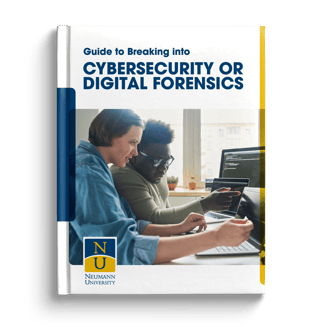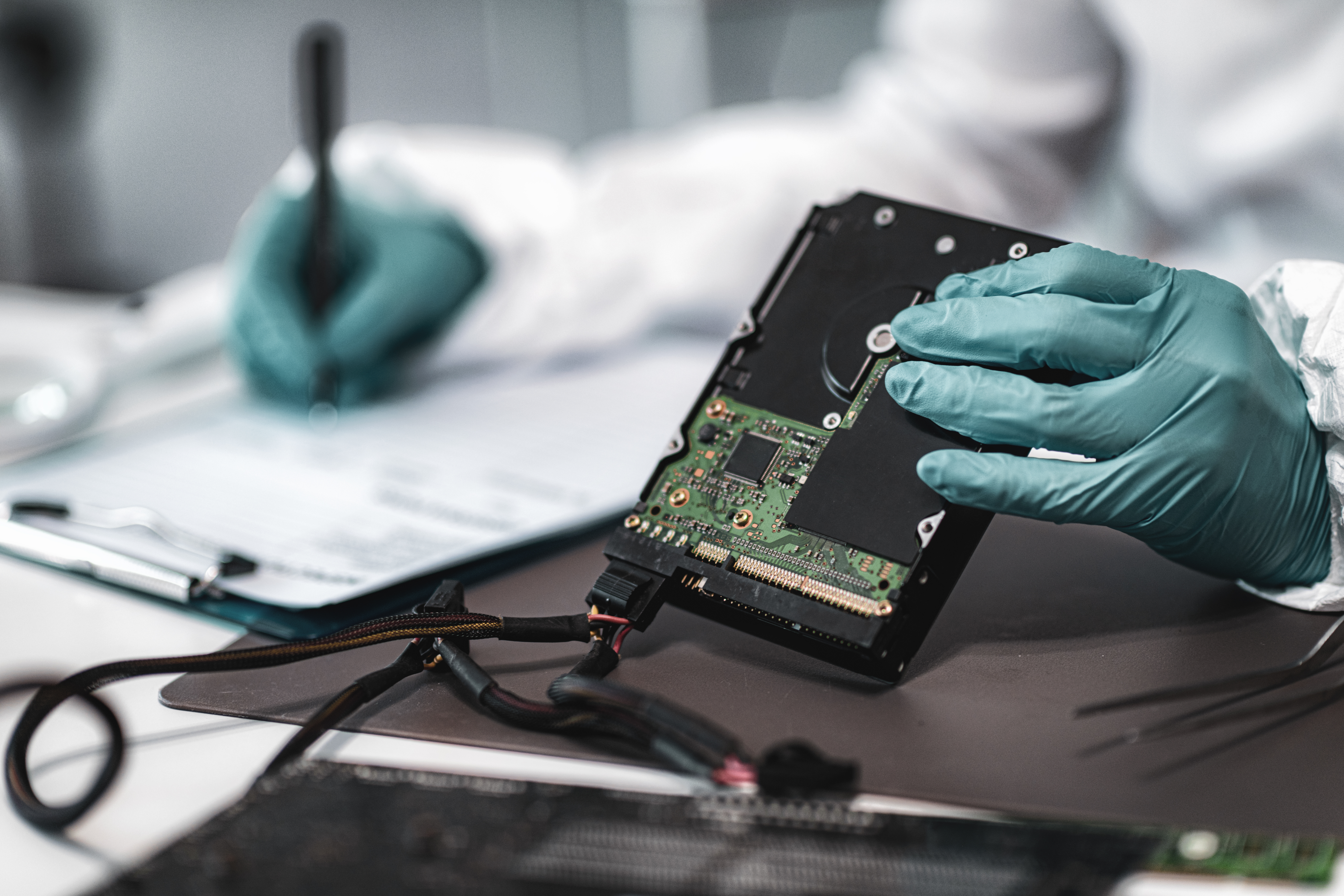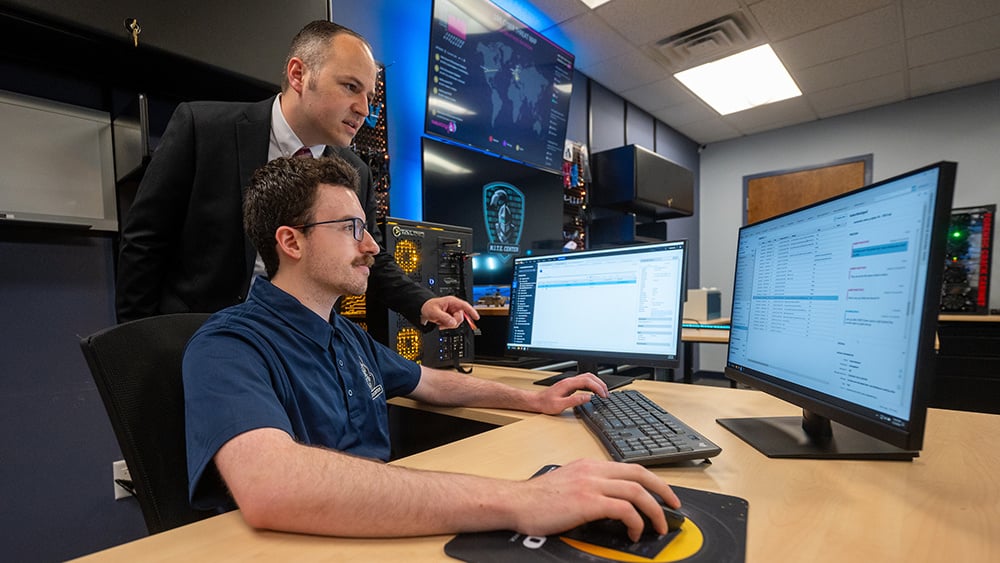
Every click leaves a trace, and for today’s cyber experts, that trail tells a story. In a world where digital threats evolve daily, cybersecurity professionals must also think like investigators. A strong cybersecurity program doesn’t just teach you to protect data; it trains you to uncover digital clues, piece together evidence, and outsmart the criminals behind the code.
That’s where computer forensics comes in. A cybersecurity degree can be the foundation that equips you with the technical, analytical, and ethical skills needed to pursue impactful work in digital investigations and computer forensics careers.
What Is Computer Forensics?
Computer forensics is the practice of collecting, analyzing, and preserving digital evidence from computers, networks, and electronic devices. Professionals in this field uncover the who, what, when, and how of cyber incidents—providing crucial information for criminal investigations, corporate security, and legal proceedings.
From recovering lost data to identifying the source of a breach, computer forensics helps bring justice to victims of cybercrime and digital fraud. As more crimes leave digital footprints, this work has become essential to modern investigations.
Learn more about how investigators solve digital crimes in our blog: Solving Crimes in the Digital Age.
Computer Forensics vs. Cybersecurity: What’s the Difference?
While cybersecurity and computer forensics share common ground, their primary focuses differ.
- Cybersecurity is proactive: it’s about preventing attacks, securing systems, and developing cybersecurity solutions to protect data before a breach occurs.
- Computer forensics (part of digital forensics) is reactive: it investigates what happened after a crime or cyberattack, uncovering evidence and tracking digital trails to support criminal, legal, or corporate cases.
Together, these fields form a powerful defense against cybercrime, helping organizations minimize risk and respond effectively when incidents occur.
Want a Job in Computer Forensics? Start with a Cybersecurity Program
A strong cybersecurity program provides many of the same technical and analytical foundations required in computer forensics.
The big differentiator? When programs, like Neumann’s, offer a focus or track in digital forensics, your job opportunities in IT, cybersecurity, and forensics expand even further. This specialized training strengthens your ability to pursue roles in law enforcement, cyber investigation, and threat detection, helping you stand out in a growing and competitive job market.
1. You Develop Key Security Skills
A cybersecurity degree introduces students to today’s most common threats, including malware, phishing, ransomware, and more. Coursework and digital labs help students learn to investigate cyber incidents, analyze vulnerabilities, and recover evidence from digital systems, all of which are essential skills for computer forensics work.
2. You Understand Cyberattacks
Through cybersecurity courses, students explore the history, patterns, and motivations behind cyberattacks. Understanding the psychology and strategy of bad actors helps future forensic investigators anticipate threats and trace attacks back to their source.
3. You Gain Skills in Threat Detection
Modern cybersecurity programs teach students to identify and mitigate emerging threats by analyzing malware and utilizing intrusion detection tools. Because many crimes today have a digital component—from financial fraud to data theft and even personal identity crimes—these same methods are essential in computer forensics.
Students learn how to trace how an attack spreads, uncover hidden digital evidence, and connect those findings to real-world events that help solve crimes.
4. You Develop a Legal and Ethical Understanding
Effective cyber investigation requires a deep understanding of digital law and ethical responsibility. As more crimes involve digital evidence, such as emails, financial records, or location data, professionals must know how to collect and preserve this information properly.
Many cybersecurity degrees include coursework on digital evidence, privacy, and regulatory frameworks—knowledge that’s critical for professionals who may testify in court or handle sensitive data as part of a computer forensics investigation.
5. You Become Fluent in Encryption and Decryption
Encrypted data is often central to cybercrime investigations. Students learn how encryption protects data and how forensic experts ethically decrypt information during investigations to uncover the digital trail.
6. You Earn a Marketable Degree
Most importantly, the field is demanding a high level of training and knowledge, and employers are actively seeking well-trained cybersecurity and forensic experts.
A cybersecurity degree offers flexibility and high demand across many industries. Whether you pursue roles in computer forensics positions, network security, or data protection, this credential signals that you’re equipped to handle complex digital challenges in an evolving field.
For those in law enforcement, this degree can be especially valuable. As more crimes involve digital evidence, having a background in cybersecurity and computer forensics helps officers and investigators differentiate themselves, advance their careers, and bring critical technical expertise to their departments.
Whether you pursue roles in computer forensics, network security, or data protection, this credential signals that you’re equipped to handle complex digital challenges in an evolving field.
NEUMANN UNIVERSITY’S CYBERSECURITY & FORENSICS PROGRAM
Neumann University’s M.S. in Cybersecurity and Forensics prepares you to thrive at the intersection of technology, security, and justice. Organizations and law enforcement agencies need professionals who can do more than protect networks—they need experts who can uncover, interpret, and respond to digital evidence when crimes happen.
At Neumann, you’ll gain both the defensive expertise of a cybersecurity professional and the investigative mindset of a forensic analyst. Courses emphasize real-world application through hands-on digital labs, ethical training, and advanced instruction in threat detection, risk assessment, and cybercrime investigation.
Graduates emerge ready to pursue impactful careers across industries—whether safeguarding data and infrastructure in corporate IT or serving on the front lines of digital forensics in law enforcement, government, or private investigation.
Take the first step toward a career that protects and defends our digital world.
Download the Guide to Breaking into Cybersecurity and Digital Forensics or Request More Information to connect with our admissions team today.
 CHALLENGE
CHALLENGE









